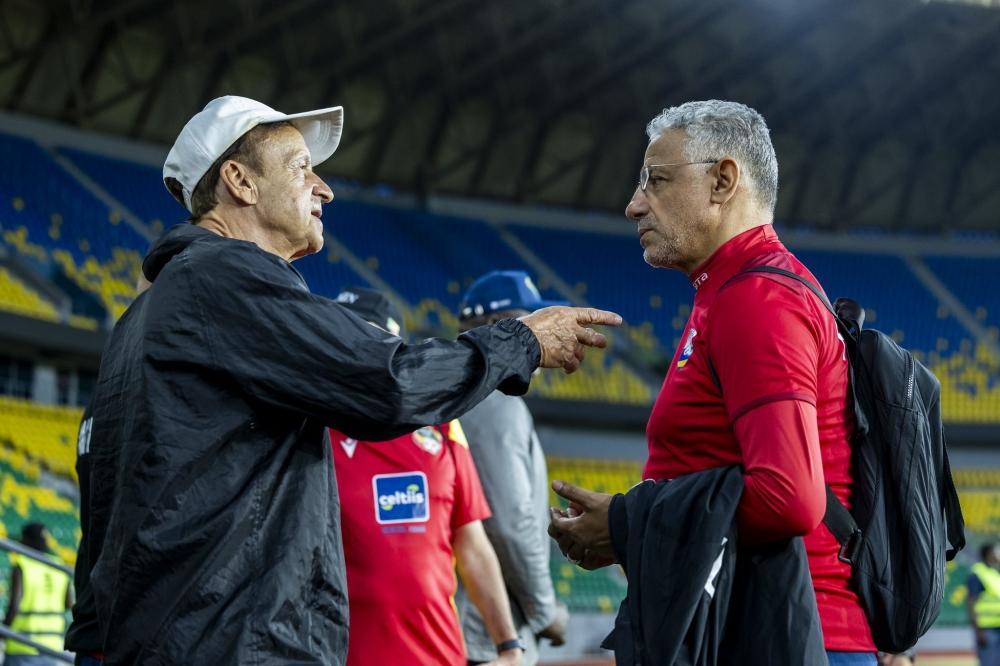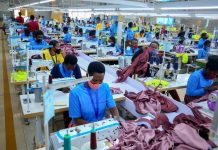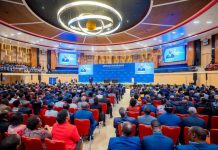Africa-Press – Rwanda. After a crushing 3-0 defeat to South Africa in their final 2026 FIFA World Cup qualifier, Rwanda were left with more questions than answers about their future under head coach Adel Amrouche—yet those questions will need answers sooner or later. Sooner is better.
While the Algerian-Belgian tactician insists that the qualifiers were a “learning experience,” many fans and analysts are beginning to question whether he is the right man to lead the national team forward. Stability is key, but without optimism, it becomes the total opposite.
Head coach Adel Amrouche speaks to journalists ahead of the game against Benin. Photo by Olivier Mugwiza
When Amrouche took over from German coach Frank Torsten Spittler in March, expectations were cautious but hopeful. Spittler had laid a decent foundation—beating South Africa and holding Zimbabwe to a draw in the opening two matches. Rwanda were top of Group C.
However, since Amrouche assumed the reins, Rwanda’s campaign has nosedived—four losses, one win, and a draw. The Amavubi finished with 11 points from 10 games. Only Zimbabwe, who finished bottom, had a less tally (5 points).
Out of Rwanda’s tally, seven points were gained under Spittler from four matches. Under Amrouche, Amavubi only managed four points from six qualifiers. Not an inspiring return.
Despite these numbers, Amrouche has refused to lay blame—neither on his players, the federation, nor even himself. And for me, this is a problem, for, someone must take responsibility.
“These games are a lesson for us,” he said after the South Africa defeat. “I cannot blame any of our players, but football is like that.”
This philosophical outlook, while honest in tone, does little to appease supporters who’ve seen their team collapse, particularly in home matches—once considered almost a fortress for Amavubi.
Losses at home to both Nigeria and Benin, and draw against Lesotho, exposed more than just tactical naivety—they reflected a coach seemingly unable to inspire or organize his team effectively in crucial fixtures.
Rwanda’s traditionally passionate home crowd at Amahoro Stadium has been left disillusioned, and even the most optimistic supporters, including your columnist, are struggling to see the path forward under the current regime.
Amrouche has called for structural reforms in youth development and a reassessment of the national team’s foundations.
While that may be valid, questions persist about his own input. After all, he signed a two-year deal, reportedly backed by a vision to qualify for the 2025 AFCON (which he failed) and mount a respectable World Cup campaign. On the evidence of the past six months, that vision is quickly unraveling.
Perhaps the most worrying aspect of his tenure is the regression in performance. Under Spittler, Rwanda showed discipline, aggression, and belief. Everyone had an optimistic view of the team. Not anymore!
Under Amrouche, they have been passive, error-prone, and emotionally flat. While the coach emphasizes long-term planning, international football is a results-based business—and patience has its limits.
The Rwandan Football Federation (FERWAFA) now faces a pivotal decision—continue backing a project that, so far, shows little promise, or make a timely intervention before the damage becomes irreversible.
It’s not just about results; it’s about momentum, national belief, and the image of a national team that once inspired an entire nation during their sole AFCON appearance in 2004.
Supporters don’t expect Rwanda to become a continental powerhouse overnight, actually far from it. But they do expect competitiveness, especially at home. Not the spineless performances that we have so far seen under the current regime.
Fans expect fight, pride, and a clear tactical identity—none of which have been evident during Amrouche’s brief but disappointing reign.
To his credit, Amrouche remains diplomatic and composed under pressure. But diplomacy cannot mask poor results. If FERWAFA is serious about long-term success, it must weigh the merits of continuity against the costs of stagnation. Can Amrouche turn things around with more time, or has his tenure already run its course?
With qualifiers for the 2027 Africa Cup of Nations, which will be hosted by Uganda, Kenya and Tanzania up next, a decision must be made swiftly.
A coaching change now would give a new manager time to rebuild, reassess the squad, and approach the next chapter with renewed focus.
Ultimately, the final call lies with FERWAFA. But one thing is clear: the clock is ticking, and the longer they wait, the harder the road back to credibility will be.
Sorry coach Amrouche, this is not personal, but a call of duty, and only being made in the best interest of the national team, and to a larger extend, Rwandan football. The bigger picture.
For More News And Analysis About Rwanda Follow Africa-Press






